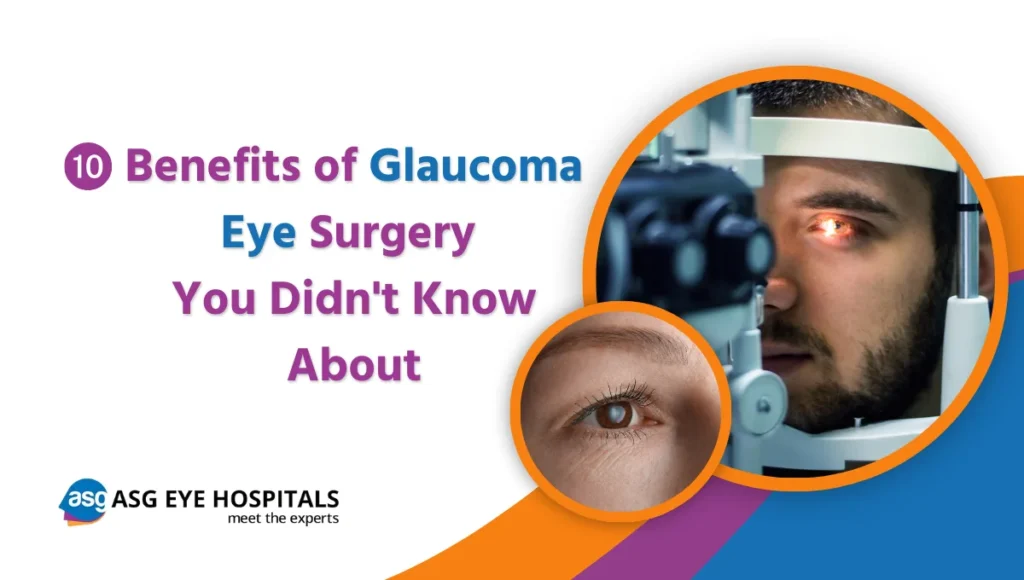Glaucoma is an eye disease that damages the optic nerve of the eye. The optic nerve is essential for good vision, it transfers the visual information from the eye to the brain. If glaucoma is left untreated it can cause vision loss. Glaucoma is also called a silent thief of sight because it develops a blind spot in the peripheral vision. Most individuals who have open-angle glaucoma do not notice any change in their vision until the damage is severe. That’s why glaucoma is referred to as the silent thief of sight.
Increased pressure within the eye is the major risk factor for glaucoma, also known as IOP (intraocular pressure). Glaucoma is of different types but the two most common are open-angle glaucoma and closed-angle glaucoma. Development in medical technology has led to various glaucoma treatment options, including glaucoma eye surgery. It offers several benefits that significantly improve your quality of life.
Let’s discuss the 10 of glaucoma eye surgery benefits that you may not have been aware of.
- It Preserves Your Vision: The main goal of glaucoma eye surgery is to preserve your vision. Glaucoma surgery reduces the intraocular pressure within the eye and helps prevent further damage to the optic nerve, which is important for maintaining good vision.
- It reduces the development of disease: Glaucoma eye surgery can slow down the development of the disease. It also improves the fluid discharge and reduces its production in the eye which helps to balance intraocular pressure and stop further damage to the optic nerve.
- It Reduces People’s Dependency on Medications: So many individuals who have glaucoma depend on eye drops to manage the intraocular pressure in the eye. But, long-term use of these medications can be problematic and may cause side effects. Glaucoma eye surgery reduces or even stops the need for eye drops, and provides a more convenient and comfortable treatment option.
- It Improves People’s Quality of Life: The loss of vision because of glaucoma can mainly impact the individual’s overall well-being and affect their ability to perform daily activities and tasks they love. Glaucoma eye surgery preserves vision and slows disease development, which improves the overall quality of people’s lives and allows them to maintain independence and enjoy a better sense of well-being.
- It Lowers the Risk of Vision Loss: If you cannot take glaucoma treatment in its early stage, it can lead to vision loss and even blindness. Glaucoma eye surgery helps lower the risk of vision loss by effectively managing intraocular pressure and preventing further damage to the optic nerve.
- Minimally Invasive Options Available: Surgical techniques and many glaucoma eye surgeries are now minimally invasive. Procedures such as trabeculectomy, and minimally invasive glaucoma surgery (MIGS) provide effective treatment with smaller incisions, fewer complications, and shorter recovery times.
- It Can Be Combined with Cataract Surgery: It is very common for people who have glaucoma to develop cataracts (clouding of the lens in the eye). Glaucoma eye surgery can be combined with cataract surgery and address both conditions simultaneously, improving overall visionary results.
- Customized Treatment Options: Each case of glaucoma is unique, the condition of people may vary and what works for one person may not be suitable for another. Glaucoma eye surgery provides customized treatment options and addresses your particular needs and preferences. That gives you the best possible outcome for your situation.
- It Gives Long-lasting Results: Glaucoma eye surgery may not always be a one-time fix, but it can provide long-lasting results that effectively manage intraocular pressure and preserve vision for years. Proper follow-up care and observation can help the benefits of surgery over the long term.
- It Enhances the Peace of Mind: Dealing with a chronic eye condition like glaucoma can be stressful and anxiety-inducing. Glaucoma eye surgery provides peace of mind. Choosing this surgery means you’re taking proactive steps to preserve your vision and maintain eye health for the future.
Glaucoma eye surgery provides several benefits, not only lowering intraocular pressure. It preserves vision and slows down the development of disease, reduces dependence on medications, and improves overall quality of life. Surgery can make a significant difference in the lives of individuals with glaucoma.
If you’re considering glaucoma eye surgery, discuss your options with your ophthalmologist or eye care specialist at the best eye care center to determine the best course of action for your particular needs.
Some Queries Related to Glaucoma Eye Surgery:
What are the potential risks of glaucoma surgery?
The potential risks associated with glaucoma eye surgery are infection, inflammation, changes in vision, and bleeding. But there may be no serious complications. Before your surgery, your surgeon will discuss the potential risks and the benefits of this procedure.
Is glaucoma surgery painful?
Glaucoma surgery is performed under local or general anesthesia, so you shouldn’t feel any pain during the procedure. Some discomfort or mild pain may occur after surgery, but your surgeon will prescribe pain medication to help manage any discomfort.
How do I know if I’m a candidate for glaucoma surgery?
Your eye specialist will assess your situation, including the severity of your glaucoma, your overall eye health, and your medical history, to determine if you are a candidate for this surgery or not and they will discuss the potential risks and benefits with you and help you make an informed decision.
How soon after glaucoma surgery will I notice the benefits?
The timing of when you’ll notice the benefits of glaucoma surgery can vary. Some patients experience immediate improvements in intraocular pressure and vision, while others may see gradual changes over several weeks or months.
Are there different types of glaucoma surgery, and do they offer benefits?
The different types of glaucoma eye surgery are trabeculectomy, minimally invasive glaucoma surgery (MIGS), and laser trabeculoplasty.
Each type offers unique benefits and risks, and the choice of surgery depends on factors such as the severity of the glaucoma and the patient’s overall health.




